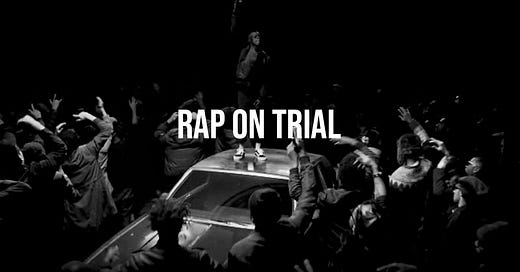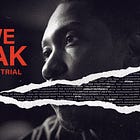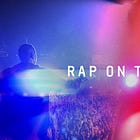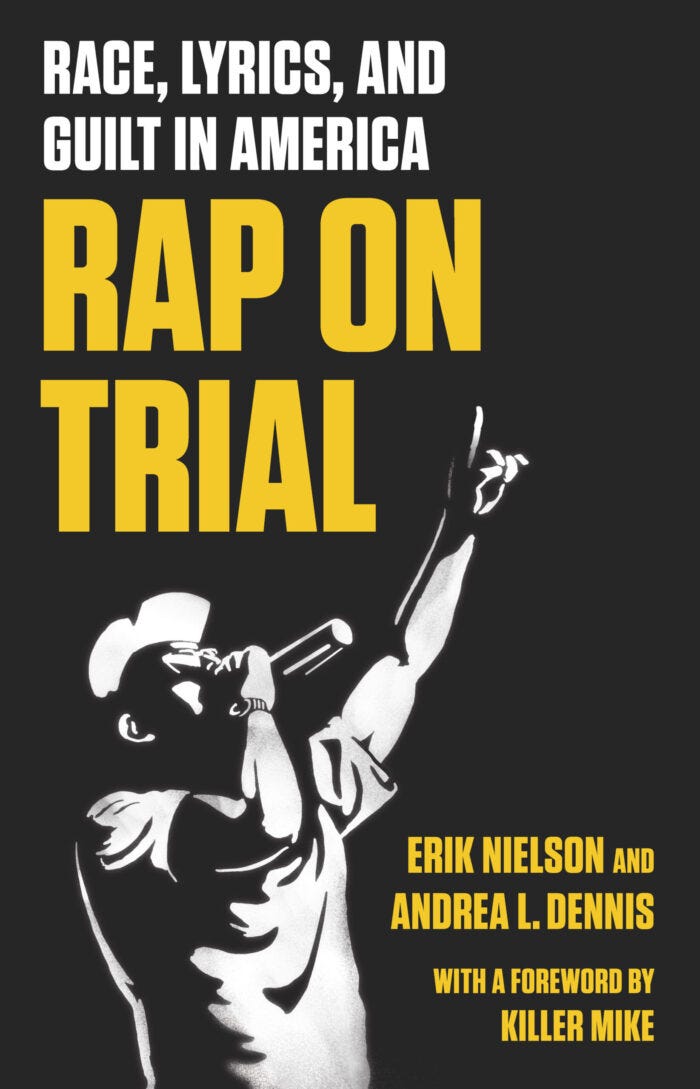The AS WE SPEAK Case Study (Part III): From Inception to Emmy Nomination
Part III: Lessons learned and opportunities squandered
Read Parts I and II of the series here:
Two years into development and still no deal. But the little wins had come often enough to keep the fire burning bright. The next phase would be the biggest test yet, as we delivered another documentary, while pitching this project, just as the world shut down for a global pandemic.
In the fall of 2019, the pitch meetings came less frequently. Pete and I had had a fallout with our agent at CAA over the summer, and though we had just signed a six month shopping rights extension, the first signs of discontent emerged between us and the rights holders. Between Erik’s involvement in prominent case of the Drakeo the Ruler, and whispers about their upcoming book release (at least within the hip hop and advocacy communities), both Erik and Andrea started to field direct outreach for interview requests and the rights to the book. For the first time, Pete and I were not driving the momentum of this project.
An executive from the hip hop media site Genius (formerly Rap Genius) reached out to Erik on August 21, just after we signed our fourth shopping rights extension. The guy came in hot, aggressively pitching Erik on his own credits in the unscripted space (which were modest, at best), and on the company’s stature in the hip hop community (a much stronger case). I asked Erik to put me on the phone with Mr. Genius, in hopes that he might approach the current rights holder — the guy who locked up the RAP ON TRIAL authors two years earlier — in good faith. I could immediately tell he was not interested in any kind of collaboration, that his primary intent was to convince Erik to get out of his contract with us, and sell his rights to Genius. He knew we owned the rights exclusively, but that would not stop him from trying to drive a wedge between us (the no-name producers) and him (an executive at one of the preeminent online rap brands). The hunt was on, and Pete and I were the prey.
Producing Lesson #1: No matter what your contract says, IP rights are always about the relationship between you and the rights holder. Keep that bond strong.
While it’s true, we had a signed agreement with Erik and Andrea, it was only a shopping agreement, which I noted at the outset is among the weakest rights deals you can sign (it’s also the least expensive, which was our primary motivation). What’s more, the term on that deal only lasted until the following February, and at expiration, the authors could easily jump to a new producer, with no recourse on our end for all the time, effort, and money we had put into the project’s development. Hell, they could even breach our contract, jump in with Genius now, and dare us to sue them — which we all knew we wouldn’t do. So our only defense was to keep the bond with Erik and Andrea as strong as possible, and show them how hard we were willing to work to get this project made.
RAP ON TRIAL released
NOVEMBER 12, 2019 — After working with Erik and Andrea for two years, hearing them discuss the tone, direction, and content of their book, and getting a glimpse at excerpts, we finally got to read RAP ON TRIAL: Race, Lyrics, and Guilt in America in November 2019. And it was AMAZING.
I cannot recommend this book enough. To give you a sense of the scope and style of the writing, here is an excerpt of Killer Mike’s foreward, which sets the stage for a dynamic exploration of music, race, culture, and America:
We all benefit from the artists who push the boundaries of speech, and so as a country we should see a collective interest in protecting them. This is especially true for artists who criticize the state, because once the state —which is supposed to be a representation of the people — is above reproach, we are entering Orwellian waters… If you want to know how society is going to treat people under the law, look first at how they treat the most marginalized, the people that are in the minority. African Americans, the descendants of slaves, are the petri dish for what the law is going to do.
The book is an easy-to-read yet intricately lawyered tale of individual rap artists, on top of a dissection of thirty years of social and criminal justice policies and political movements, all on top of stark depiction of a punishing racial order on which the country was built — all written as a love letter to hip hop. I read this book after two-and-a-half years of knocking on doors asking anyone in Hollywood to bring the subject to the screen, with no takers. To anyone in my world, it would have been the smart move to put this project down and move on. But after reading RAP ON TRIAL, there was no way that was going to happen. We were going to make this film, no matter what.
The Quibi Proposition
For New Years 2020, my wife (then-fiancé) and I went to Japan for the first time. It was incredible — three days in Tokyo, then four days skiing in Hokkaido with my best friend who was a ski guide there. A reset trip if there ever was one. I came back to the States in 2020 with renewed purpose, and vowed to bust my ass to sell this project that year.
Mr. Genius had been sidelined for the moment, and I knew that with only a few months until the premiere of our first documentary, BLACKBALLED, we would soon have some wind at our backs. BLACKBALLED was commissioned by Quibi, the $2 billion short form, mobile-only platform launched by Jeffrey Katzenberg. We had been working on the film for four years, and finally would get a chance to show our work in just a few months. In meeting after meeting with Quibi execs, we were told the platform would launch in April with an enormous marketing push — it had commissioned shows from some of the biggest filmmakers (Chrissy Tiegen! Kevin Hart! SPIELBERG!) and would roll them out with as much Hollywood firepower as Katzenberg could wrangle. What’s more, our series would be released within the first month of the platform’s launch, and was almost guaranteed to generate lots of coverage: The documentary looked at the expulsion of the racist, former owner of the LA Clippers, Donald Sterling, from the NBA, and featured NBA stars Chris Paul, JJ Redick, DeAndre Jordan, and coach Doc Rivers, as well as NBA commissioner Adam Silver and Disney CEO Bob Iger. It would be the first time all of those people spoke on camera about one of the most consequential moments in NBA history, while examining that moment in the context of race, sports, business, and American history.
Needless to say, there was a lot riding on this series for me and Pete. In Hollywood, each project has to be a springboard for your next one, so we had our sights set on leveraging the high-profile launch of BLACKBALLED to finally sell RAP ON TRIAL, another story that looked at race and music in a way no documentary had before.
This was our pitch to Erik and Andrea for our next rights extension.
** Rights Extension 5: February — May 2020
They were skeptical. Years had passed without an offer, and they weren’t especially convinced that we could pull off a deal to turn their book into a movie or tv show — and the idea that a mobile-only startup app would be some kind of sales launch pad seemed laughable to them. They were still on board with our vision, and trusted that we would keep working hard to set up a sale, but they wanted a tighter leash. We agreed to accept a three-month rights extension.
What was the worst that could happen….?
We kicked off the new year with a positive meeting with G-Unit, 50 Cent’s company that had an overall deal with Starz. We followed that up with a pitch to the Quibi executives that had just bought BLACKBALLED, and saw our storytelling and producing capabilities in action. Using our city-by-city outline, and the same directing and producing team as BLACKBALLED, we thought the pitch would be a home run — Quibi had a very particular storytelling format, where each episode needed a full opening and closing hook, and also have a through line that would keep audiences engaged from one episode to the next. We customized our project just for them, with the ongoing drama of the Drakeo case as the through line, and thematic episodes based on different cities comprising the bulk of the show.
They really liked the pitch, but said they wouldn’t be able to make a decision until after the platform launch in April.
Then…..COVID hit.
As we focused on delivering BLACKBALLED with a suddenly-remote post production workflow, we started speaking with another agent at Paradigm, who loved the project and offered to set up pitches. After we all downloaded Zoom, the team from BLACKBALLED reassembled virtually for the following pitches:
Sony - April 14
HBO - May 12
HBOMax - May 13
In the meantime, BLACKBALLED premiered to very positive reviews. Unfortunately, it dropped directly on the heels of Netflix’s THE LAST DANCE, and in the midst of a truly disastrous launch for Quibi. All of the snowball effect we had hoped for from our first documentary went out the window — Quibi ended up being seen as a stain. By the middle of the summer, the Quibi execs we had pitched could already see that their ship was sinking. The platform missed their projected subscriber numbers by a magnitude of millions, and were so underwater so fast, that the company was out of business by November. Needless to say, they did not acquire RAP ON TRIAL.
Producing Lesson #2: Never put your own success in the hands of a third party, especially not a streaming service.
This lesson has become more and more clear in the time since, but the seed was planted in 2020. Quibi’s failure amounted to a total destruction of the plan Pete and I had in place for the success of District 33, our production company, since its founding in 2017. It had been the only path we envisioned for upward mobility as independent producers — and now, five years later, with the creator economy in full bloom, I cannot believe I rooted so much of my potential success on a single project on a single streaming platform. It is now clearer than ever:
Own your audience, own your success.
Onward…
In June, HBO and HBOMax warmly declined to pick up the project. The best response was actually from Sony — their executives LOVED the project, but were forthright enough to say that their legal department would almost surely derail the project.
Back to the rights holders for another extension.
** Rights Extension 6: June — August 2020
Luckily, Erik and Andrea were finally able to see the quality of our work in BLACKBALLED, and agreed to one more three-month extension. We also committed to them that Pete and I would invest money into cutting a sizzle for the Rap on Trial documentary:
We focused the sizzle on the Drakeo the Ruler re-trial, which was still set to go later that year. I also got Erik to introduce me to Jeff Weiss, the journalist who was more responsible for elevating Drakeo’s story that anyone in media. In my view, his appreciation for the music, and meticulous critique of the injustices against Drakeo could be immensely valuable to a documentary about the larger issues of rap music on trial. In my opening email to Jeff, I mentioned that we were putting together a concept for an ongoing doc series about the use of rap lyrics as evidence, and that we wanted to use Drakeo’s case as a focus of season one. In a three sentence response, Jeff effectively gave me the finger, believing that I was trying to “use my labor for your own production.”
Producing Lesson #3: Journalists are a different type of rights holder.
This is not a knock on journalists — I was one for two years before law school, and it was my major in college! But I was trained in news-gathering, writing, editing, and long form nonfiction storytelling. What I was not trained in was story capture and rights exploitation. Somewhere along the way, the really good journalists acquire a sense of ownership over the stories on which they report. It’s an understandable position, given the amount of time a good story takes to cultivate, report, and publish. But that sense of ownership can get very complicated when it comes to long-form adaptation. Filmmaking is a very different skill from reporting and writing, but many journalists often also see the skills as naturally transitive — it’s just storytelling, after all. I have encountered it over and over, and in this case, even though it was clear I was reaching out as a potential collaborator, and not to exploit this journalist or his work, Jeff’s reaction was an otherwise predictable retrenchment, a declaration of stewardship of all Drakeo-related storytelling.
I knew this would not be the last time Jeff and I crossed paths, so I apologized for any misconception about my intentions, and let sleeping dogs lie. Meanwhile, we continued to set pitches:
Netflix - June 30
BET - Aug. 6
As our summer rights window came to a close, and COVID raged on, we came to Andrea and Erik with a full schedule of pitches lined up to capitalize on the fall pitch season.
** Rights Extension 7: August — November 2020
After Labor Day, we set as many Zooms as we could with streamers, studios, independent financiers, and anyone else that claimed to be acquiring docs at that point:
Amazon/IMDBtv - Aug 31
XTR - Oct 21
Snapchat - Oct 28
Storied Media Group - Nov. 9
NBC News Studios - Nov. 10
Pulse Films - Nov. 25
End Cue - Nov. 30
We were still pitching the same format, with Drakeo at the center of Season One. His re-trial date still had not been set, and at that point I was regularly in contact with both Erik and Drakeo’s attorney, John Hamasaki. At the same time, the case had started to come up in pre-election debates between the incumbent LA County DA, Jackie Lacey, and her progressive challenger George Gascón, whose platform was directly tied to reversing the systemic injustices in LA’s criminal justice system. Drakeo’s re-trial was Example No. 1, and on election night, Gascón’s message prevailed.
Drakeo the Ruler released from prison
NOVEMBER 4, 2020 — The morning after the 2020 election, I got a text from Erik Nielson that Gascón was going to drop all charges against Drakeo the Ruler and release him from custody that day. I immediately drove to the Compton Courthouse, where I had once clerked and was sworn in to the California Bar, to witness Drakeo’s release. John Hamasaki, was waiting there, as was Jeff Weiss and a few of Drakeo’s closest friends and advisors. We all waited outside the courthouse for several hours — Jeff and I exchanged a few words, but I was more than comfortable sitting in the background, as those closest to Drakeo eagerly awaited the release of their friend and client who had been placed in solitary confinement for months awaiting his court date.
As we all sat eating or lunch, the doors suddenly swung open.
It was an amazing day. Drakeo and crew immediately left to celebrate. I chatted with Hamasaki briefly, but everyone was focused on their newly freed friend, not on my fledgling documentary.
A month later, I reached out to Jeff Weiss once more, and this time received a much more pleasant response. Still, he kindly declined to participate in the documentary, and I made clear we were still going to move forward with telling Drakeo’s story as part of a larger examination of the issue. A week later, Paradigm was able to set up a call with Drakeo’s manager, which started off friendly, until the manager asked about payment. He expected us to make a substantial financial offer for Drakeo’s participation. We informed him this wasn’t that kind of documentary — it wasn’t the Drakeo story, it was the Rap on Trial story, with Drakeo playing a key role, and none of the participants receiving financial compensation. That didn’t fly….
Just before the holidays, Drakeo’s team informed Paradigm that the rapper would not commit to our documentary. I never found out whether Jeff put the word in to shut us out from Drakeo’s team, but it didn’t matter. Just like that, Drakeo was off the table. A year and a half of building relationships with his legal team, hours spent at the courthouse and researching his case. All of it was gone, and we were back to square one. The film had no lead subject, and our final shopping agreement with Erik and Andrea was set to expire….again.
The Final Shot
The close of 2020 was decidedly more ominous than the previous year. In the wake of losing Drakeo, my wife (still then-fiancé) and I decided to get a puppy from a breeder in Waco, Texas. Since it was still the height of Covid, we opted for a winter road trip to pick up our cavapoo (her choice) named Mookie Betts Jr. (my choice). The drive there was incredible — late December in the desert, from LA to Tuscon, down to Marfa, and into central Texas. We picked up Mookie on December 31, a rainy morning that grew progressively more torrential as we drove west. Within three hours, the rain had turned to snow, and cars on Interstate 20 slowed to a crawl. Big rigs had jackknifed on either side the highway, and we finally came to a stop 10 miles from Big Spring, Texas. Our gas tank was running low, and the puppy in our laps was terrified.
We managed to pull off the highway in the middle of an absolute blizzard, and found a room at a Sleep Inn. The moment we opened the hotel room door, a rat ran across the room. We huddled in bed with our new dog, closing out the year in perfect 2020 fashion: abject terror for the hours and days ahead.
When the first work-week of 2021 began, I convened the BLACKBALLED team to ask who really wanted to stick with this project and see it to fruition. Ryan Simon, producer and owner of the production company Strike Anywhere, was in, and he had an idea to propose to Erik and Andrea: an independent finance company that was run by a prominent attorney and First Amendment activist. It seemed like a perfect fit.
We pitched the rights holders on giving us one last shot. We could set a meeting within a couple weeks, and start actually making the film immediately if they were interested in providing even development funding. The term we proposed was six months, with a six month extension if we received bona fide interest from a third party. This was our last shot….and they said yes.
Come back next week to see when we finally meet our director…









